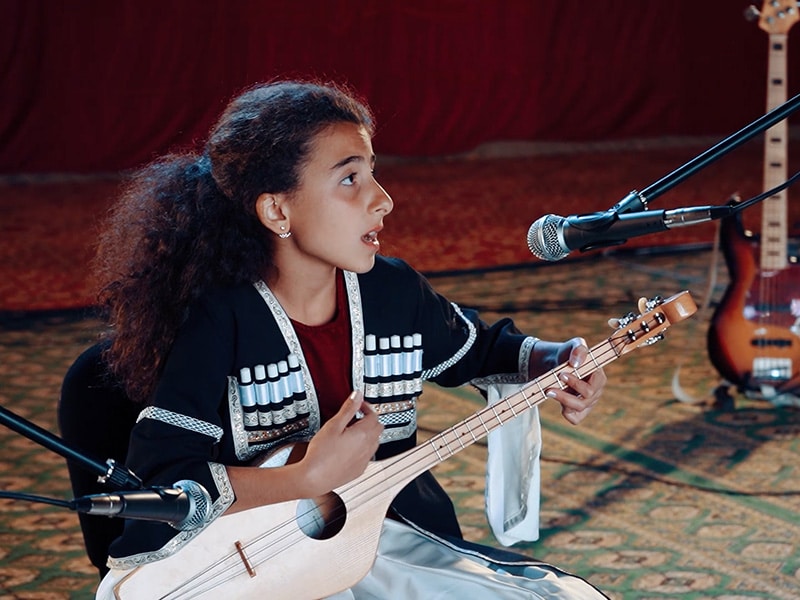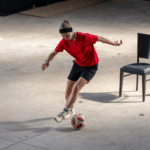Music Enjoyment: Is It Possible With a Cochlear Implant?
Music is everywhere—but can you enjoy it with a cochlear implant? Absolutely! We talked to music educator Malin Kumkar to find out more.

What would our world be like without our favorite songs, live concerts, playlists, or music on the radio? Life without music is almost impossible to imagine. We are surrounded by it practically everywhere we go, and it’s so much more than just a melodic sequence of notes and sounds.
Music means taking part in a world that extends beyond informative communication. It reminds us of very special moments. It can motivate and comfort us. It connects us across age, cultural, and national differences, creating community in a unique way.
Music is something quite wonderful, so we at MED-EL believe that it should be accessible to all people. In order to provide the greatest number of users with the best possible hearing experience, our cochlear implants have the broadest portfolio of long and flexible electrode arrays on the market and FineHearing technology.
However, technology can only serve as the foundation. As with speech understanding, cochlear implant users have to learn how to hear music (again).
We talked about how to turn music frustration into music enjoyment, tips and tricks that help with training, and why listening to music can even improve speech understanding with music educator Malin Kumkar.
Malin, what exactly do you do as a music educator?
As a music educator, I look at people holistically and figure out how they can be supported with music. I place an emphasis on providing people with easy access to music. The focus is on the music experience, not mastering music. I create accessible experiences—in the form of workshops, for example—especially for target audiences that often don’t have access to music.
Is that the reason you also chose to specialize in working with people with hearing loss?
Yes, inclusion is important to me. I personally got to know classical music from an achievement-oriented and elitist view. I think that’s a shame. Today I realize that music is or should be something collaborative that creates community, something that is experienced together. But I’ve realized that some music genres are only accessible to certain groups within our society.

I think that everyone should be able to experience the magic of music, and helping them do so is exactly what I’ve set out to do. People with hearing loss are often forgotten when it comes to music. I know how privileged I am to have a trained ear and how challenging it is for people with hearing loss to learn this enjoyment of music (again)—something that’s second nature to me.
Users tell us that listening to music can be particularly difficult after implantation. Are there certain music genres that people with cochlear implants can perceive better?
The structure of music is particularly complex and has a wide spectrum of volume, frequencies, and pitches. I recommend that people with an implant start off with electronic and pop music; neither is very complex. Start with simple melodies, and increase the complexity step by step, gradually adding more instruments or tonal colors.
I have noticed that low-pitched sounds (for example, cello or French horn) are preferred by cochlear implant users. These instruments often resonate more perceptibly in a room. That’s why live events are so important. I have also noticed that proximity plays an important role; the closer cochlear implant users are to the instrument, the more profound the hearing experience.
Can music training contribute to better hearing in general?
Yes. Speech and music have similar parameters, such as rhythm, pitch, and tonality. Music training helps in recognizing voices more quickly and being able to focus in on particular hearing input in situations in which lots of people are talking over one another or there is a lot of background noise.
Music training helps people with hearing loss better recognize intonation. So they don’t have to rely solely on facial expressions but can recognize a speaker’s emotions or whether something is meant ironically or sarcastically based on vocal melody.
How can users practice listening to music at home?
The most important things are being patient and open and not giving up. Hearing with an implant is simply different than with “normal” hearing. Initially, it is often helpful to listen to music that you liked before implantation. Or you may find that you enjoy new types of music, and that’s OK. The important thing is enjoying music again.
Having good music training techniques also helps. Headphones and speakers specifically designed for the needs of individuals with cochlear implants can positively influence success in training and music enjoyment. Several streaming apps now also offer an equalizer function that can be used to adjust music individually. Something that definitely helps is talking to other users about how they rediscovered music.
Can people with cochlear implants learn how to play an instrument?
Of course! But the pressure to perform needs to take a back seat. That’s true for both people with “normal” hearing and people with cochlear implants, by the way. We have to free ourselves from the thought that when learning how to play an instrument, we must be able to play it as perfectly as possible as soon as possible. Instead, we should think of making music as a way to express ourselves, as something that can make us feel good.
Which instruments are best-suited?
Instruments with predetermined tones—with keys or frets, for example—are especially suitable. For that reason, piano, harpsichord, percussion instruments, and guitar are generally easier to learn than saxophone, flute, or oboe. Wind instruments often have a harsh, loud sound that can be difficult for cochlear implant users. But there are cochlear implant users that can play those instruments with correct intonation.
Stringed instruments can also work well. Although they may be more difficult to learn initially, they are close to the body, which means users can use additional sensations, such as vibrations, to learn. For that reason, I recommend simply choosing an instrument that feels good.
How can parents provide early music training to children with hearing loss?
There are lots of options, and the following suggestions aren’t restricted to parents of children with cochlear implants. Music is so much more than we adults often perceive. In my workshops for children, I see time and again that children can occupy themselves with the simplest sounds for ages.
And I can’t emphasize enough that music is a communal experience. It’s important that parents take time to make music or sing with their child. It’s not about perfection but rather about sharing an experience. I’d like to encourage parents of children with cochlear implants to have the courage to try new things. Music is for everyone and should be experienced by everyone.
Thanks for your message. We will reply as soon as possible.
Send us a message
Field is required
John Doe
Field is required
name@mail.com
Field is required
What do you think?
The content on this website is for general informational purposes only and should not be taken as medical advice. Please contact your doctor or hearing specialist to learn what type of hearing solution is suitable for your specific needs. Not all products, features, or indications shown are approved in all countries.



